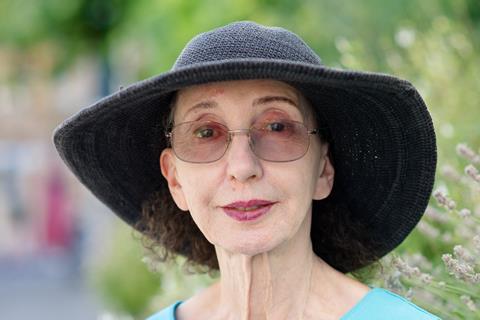
Joyce Carol Oates is attending a film festival for the very first time. The US writer has been in Neuchâtel, Switzerland, this week for the Neuchâtel International Fantastic Film Festival (NIFFF), where she has been president of NIFFF’s international competition jury.
Oates’ discipline and work ethic are renowned. Aged 84, she walks and jogs every day and having published around 60 novels as well as writing non-fiction and plays, she remains as prolific as ever. Her latest novel, ‘Babysitter’, about a real-life serial killer in Detroit, is due out later in the summer. She is hard at work researching a new book, Butcher, set in 19th-century New Jersey. She also teaches at Princeton and NYU.
She recently saw and says she approves of, Netflix’s Blonde, the Andrew Dominik- directed adaptation of her book of the same name, published in 2000, about Marilyn Monroe. This is a project which has been in gestation for around a decade and to which stars such as Jessica Chasten and Naomi Watts were previously attached before, as Oates puts it, “they aged out.”
The film has finally been completed with Cuban actor Ana De Armas as Monroe. It will stream on Netflix from late September.
Oates talks to Screen about her jury experience, attending a film festival for the first time and the kinds of films she enjoys watching.
What has it been like watching three or four films a day?
I’ve never seen so many movies all at once. It’s an unusual experience. It’s not ideal for me because people work on their movies for years. To respect the unique quality of the work, one really does need some space around it, some time around it. But the film festival by its nature is a crowded, festive occasion…the audiences are very enthusiastic. They clap a lot, they’re calling out…they kind of sing along Someone said the fans for Fantastic film festivals are particularly strange. They are a self-selected group.
But I have been making a conscious effort to think about the movies and have been taking some notes. The jurors have all their meals together. We talk about the movies over and over and so we are getting a consensus of how we feel.
How do you normally watch films?
Before Covid, I went out to movies with my friends but with Covid, we were really forced indoors so were watching movies on our television screens with Netflix and Amazon Prime. I watched this wonderful series called Peaky Blinders. It’s one of my favourites.
I thought the writing was excellent. The script was most unusual, a kind of pseudo-realism, a heightened realism, almost like opera. The use of contemporary music was so original. All the actors were very fine and the surreal elements were used very well. It was an era in English history of which I knew nothing, Birmingham, post World War One and moving toward World War Two, the rise of British fascism with Oswald Moseley and Diana Mitford. That mixture of historical and fictions figures are very well done and the issues taken up have political relevance today.
When do you usually watch films?
I usually work all day long. I start my writing at 7am and I work through much of the day with my own writing. In the evening, I like to take a break from reading and using my eyes in a certain way. Watching movies is a different use of one’s vision.
You tweeted recently about watching Antonioni’s L’Avventura again and how different it seemed from when you first watched it.
When I first saw L’Avventura, Antonioni was such an exotic name. It’s still a very interesting movie. It no longer seems so mysterious to me. It seems to be about people who are quite muddled and they make mistakes. Now, they are younger than me. When I saw it, they were older and more sophisticated. But now they’re actually younger and they seem like they don’t know what they are doing.
But Monica Vitti is so beautiful in that film.
Well, she looks like a normal Italian woman. I suppose you’re right. But in the movie, she is playing a woman who is somewhat daunted, uncertain, confused….I guess adults themselves are cast with a kind of glamour when we’re young but when we get to be older, we see they are not sure, not always happy with what they are doing, what they’re doing and are groping for meaning.
I guess that is what Antonioni is showing in other of his films too, like Red Desert, people who are making their way groping.
How involved have you been in Andrew Dominik’s film version of your novel Blonde?
I have not been involved very much. I saw the original screenplay which I thought was excellent and which [Dominik] wrote. I approved of that. Then I just forgot about it. So much just goes into oblivion, other novels of mine that people thing they’re going to make. They just disappear. Andrew Dominik as an artist and director has a strange talent. He doesn’t do conventional movies. He said everybody will find something to be offended by in the movie…maybe he has had difficulties with producers because he is much more defensive than I would be. I saw the movie. It’s very painful and touching. It’s not a feelgood movie. It’s not Marilyn Monroe singing and dancing. It’s about a woman who has been exploited by Hollywood, exploited by men.

























No comments yet